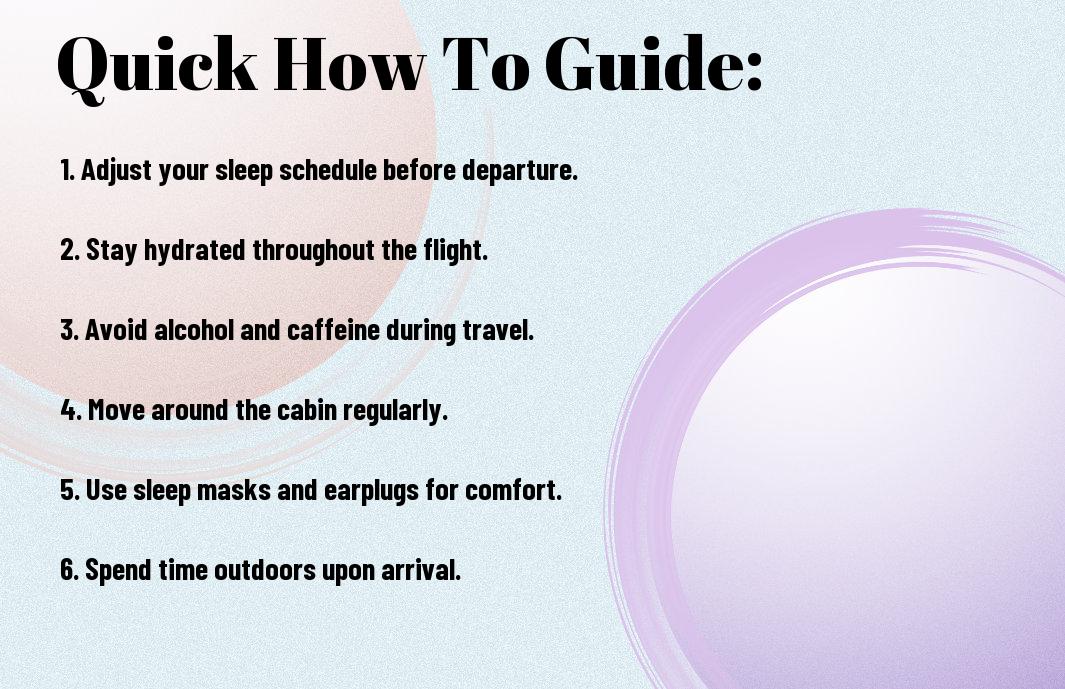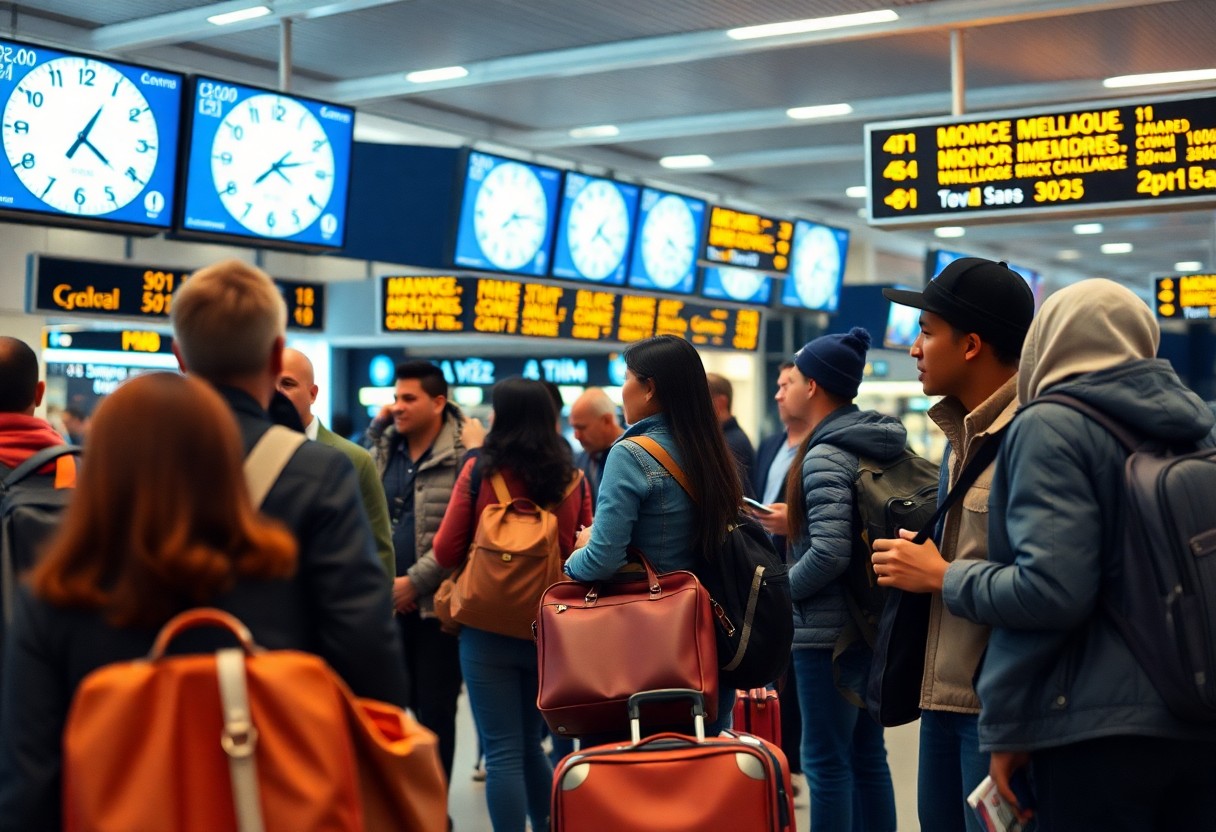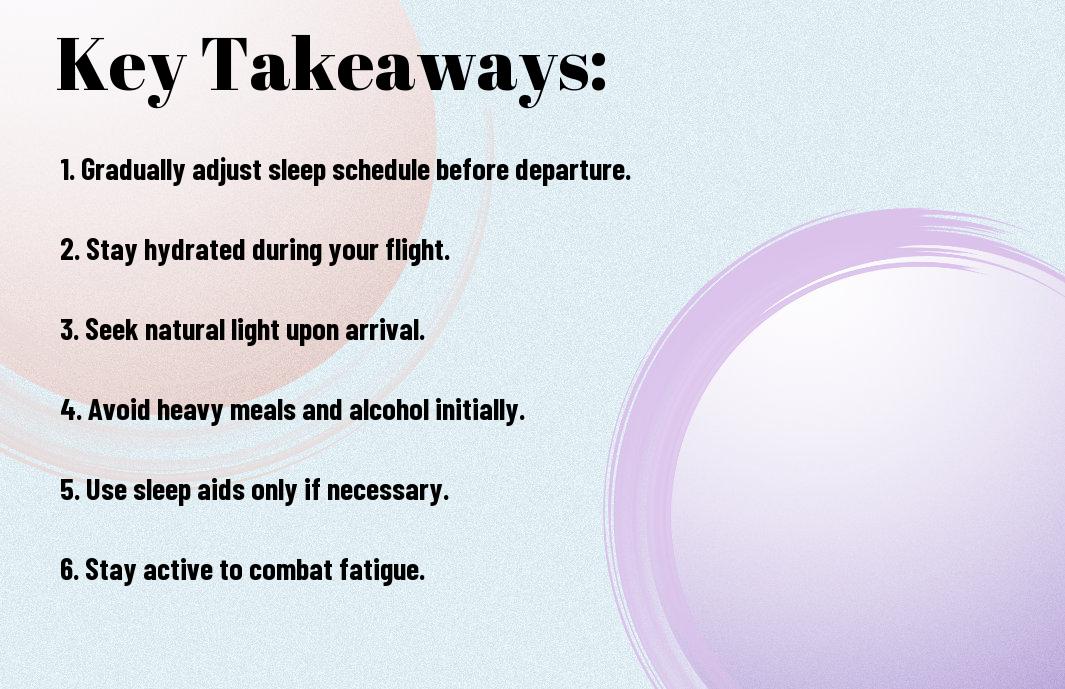Overcoming the challenges of long-haul flights is crucial to enjoying your travels, and avoiding jet lag is key to making the most of your journey. This guide provides you with practical tips and techniques to help your body adjust to new time zones quickly and effectively. Whether you’re flying for business or leisure, these strategies will empower you to feel refreshed and ready to explore your destination the moment you arrive. Say goodbye to fatigue and hello to adventure as you implement these smart approaches to minimize jet lag.
Key Takeaways:
- Adjust Sleep Schedule: Gradually shift your sleeping hours a few days before your trip to align with your destination’s time zone.
- Stay Hydrated: Drink plenty of water before, during, and after your flight to help minimize fatigue and dryness.
- Avoid Alcohol and Caffeine: Limit these beverages before and during your flight, as they can disrupt your sleep patterns.
- Use Sleep Aids Sparingly: If necessary, consider natural sleep aids or consult with a doctor for options that won’t cause dependency.
- Get Sunlight Exposure: After arriving, spend time outside to help reset your internal clock and adjust to the new environment.

Understanding Jet Lag
The phenomenon known as jet lag occurs when your body’s internal clock is misaligned with the destination’s time zone. This disruption can lead to various physical and mental symptoms, which can significantly affect your travel experience. By understanding jet lag, you can better prepare and minimize its impact during your long-haul flights.
What is Jet Lag?
Assuming you travel across multiple time zones, your body’s natural circadian rhythm can become disrupted, leading to jet lag. This condition manifests as fatigue, irritability, and difficulty concentrating, making your arrival at your destination less enjoyable.
Factors Contributing to Jet Lag
What contributes to your experience of jet lag can vary widely. Several key factors influence its severity, including:
- Number of time zones crossed
- Your travel direction (east-west or west-east)
- Flight duration and scheduled sleep
- Individual differences in circadian rhythms
- Altitude and cabin pressure changes
Perceiving these elements can help you strategize to reduce the likelihood of experiencing jet lag.
Factors that affect jet lag can be complex, integrating both physiological and environmental components. Additional considerations include:
- Hydration levels during the flight
- Food intake and meal timing
- Weekend warriors (traveling infrequently)
- Existing sleep disorders
Perceiving how these factors interact can empower you to adjust your travel routines for a smoother transition into new time zones.
Pre-Flight Preparation
While planning your long-haul flight, effective pre-flight preparation can significantly impact your jet lag experience. Ensure you research tips, such as How I Prevent Jet Lag, which can help you adapt before you even board the plane.
Adjusting Your Sleep Schedule
Even a few days before your flight, start shifting your sleep schedule closer to your destination’s time zone. Gradually going to bed and waking up earlier or later can help your body acclimate, making the transition smoother when you arrive.
Staying Hydrated
Some travelers overlook the impact of hydration on their flight experience. Drinking plenty of water before and during your flight can help combat the dehydrating effects of cabin pressure and dry air.
Understanding the importance of hydration goes beyond just quenching your thirst. Cabin humidity levels can drop significantly, leading to dehydration, which can exacerbate the symptoms of jet lag. Aim to drink water consistently throughout your journey and limit caffeine and alcohol, as these substances can contribute to dehydration. Prioritizing hydration helps keep you alert and can facilitate quicker recovery upon reaching your destination.
In-Flight Strategies
After boarding your flight, it’s important to implement strategies that can help minimize the effects of jet lag. Focus on hydration, avoiding alcohol and caffeine, and engaging in light stretching or walking around when possible. These practices can support your body’s natural rhythms and help you arrive at your destination feeling more refreshed.
Choosing the Right Seat
Strategies for selecting the ideal seat can significantly impact your comfort during long flights. Opt for a window seat if you prefer leaning against something while you sleep, or choose an aisle seat for easier access to the restroom and the ability to stretch your legs. Proximity to the wings may also reduce turbulence for a smoother experience.
Managing Sleep During the Flight
Sleep can be managed effectively during your flight by planning when and how you rest. Aim to align your sleep schedule with your destination’s time zone. Use a sleep mask and noise-canceling headphones to block out distractions, and consider using a travel pillow for added comfort.
It’s advisable to take short naps rather than prolonged sleep periods if you are traveling during the day. This approach helps you maintain energy without feeling groggy. Set alarms to prevent oversleeping and try to stay awake during the in-flight meal service to adjust to local meal times. Following these strategies can help you arrive at your destination feeling more alert and ready to explore.
Post-Flight Recovery
Unlike the excitement of travel, post-flight recovery can often feel daunting. After a long-haul flight, your body needs to adjust back to its local time and regain its energy. To effectively combat the effects of jet lag, focus on re-establishing your normal routine and allowing your body some time to adapt. Prioritize hydration, rest, and nutrition to facilitate a smooth transition back to home life.
Upon Arrival: Adjusting Quickly
Recovery is all about how swiftly you adapt to your new environment. As soon as you arrive, try to sync your activities with the local schedule. Avoid napping during the day, as staying awake until a reasonable bedtime can help reset your internal clock. Engage in light activities, such as walking or stretching, to invigorate your body.
Tips for Faster Recovery
With an effective strategy, you can expedite your recovery from jet lag. Consider these tips to enhance your adjustment:
- Stay hydrated throughout your travels and upon arrival.
- Expose yourself to natural light during the day.
- Limit caffeine and alcohol intake immediately after your flight.
- Eat light, healthy meals to regulate your digestion.
Recognizing the signs of fatigue will help you judge when to take a break or when to push forward, enhancing your recovery experience.
This approach focuses on proactive measures to ease your transition. Incorporating these strategies can significantly improve your comfort and energy levels after a long flight:
- Establish a consistent sleep schedule that aligns with local time.
- Take short power naps if absolutely necessary, but limit them.
- Invest in relaxation techniques, such as meditation or deep breathing.
- Engage with local culture to distract from lingering fatigue.
Recognizing your own body’s signals will empower you to take appropriate action for an effective recovery process.

Lifestyle Considerations
For the best chance at minimizing jet lag, consider adjusting your daily routine before your trip. Start shifting your sleep schedule a few days ahead of your departure, gradually aligning it with your destination’s time zone. Pay attention to your surroundings, including sunlight exposure; spending time outdoors can help reset your internal clock. Staying well-hydrated and adopting a healthy routine can also contribute positively to your travel experience.
Diet and Nutrition
Now, focus on your diet a few days prior to flying. Eating balanced meals rich in vitamins and minerals can support your body’s adaptability. Avoid heavy meals or alcohol before your departure, as they can disrupt your sleep cycle and digestion during the flight. Instead, opt for lighter options that include fruits, vegetables, whole grains, and lean proteins, ensuring to hydrate adequately.
Exercise and Relaxation Techniques
An active lifestyle can alleviate the symptoms of jet lag. Incorporating light exercise, such as walking or stretching, before and during your flight can enhance circulation and energy levels. Consider practicing relaxation techniques, like deep breathing or meditation, to help calm your mind and body amidst the travel stress.
Nutrition plays an important role in your overall well-being while traveling. Before your flight, aim for balanced meals that stabilize your energy levels. While in the air, consider consuming snacks that provide sustained energy, such as nuts or yogurt, rather than sugary or processed foods. This thoughtful approach to eating not only helps with digestion but also keeps your body nourished to better cope with the time change.
Additional Tips and Tricks
Keep your body in check by following these practical tips for a smoother journey:
- Stay hydrated before, during, and after the flight.
- Adjust your sleep schedule a few days prior to your departure.
- Wear comfortable clothing and shoes.
- Move around the cabin periodically to promote circulation.
- Avoid caffeine and alcohol close to bedtime at your destination.
The combination of these strategies will help ease your transition into a new time zone.
Technology Aids
Any tools and apps that can facilitate your travel experiences can be quite beneficial in minimizing jet lag. Use sleep tracking apps to help in adjusting your sleep cycle, and consider wearable devices that monitor your rest and activity levels. Additionally, meditation and relaxation apps can assist in enhancing your overall travel comfort.
Natural Remedies
Clearly, incorporating natural remedies can further support your efforts to combat jet lag. Herbal teas, necessary oils, and melatonin supplements are popular options that may assist in regulating your sleep patterns and promoting relaxation.
For instance, chamomile tea is known for its calming effects, making it a great choice before bedtime. Lavender necessary oil can be diffused or applied to your wrists, providing a soothing aroma that encourages rest. Moreover, melatonin supplements can help your body adapt to a new time zone by signaling when it’s time to sleep. You should consult with a healthcare professional before trying any supplements to ensure they’re suitable for your individual needs.
Summing up
Considering all points, to avoid jet lag on long-haul flights, you should strategically adjust your sleep schedule, stay hydrated, and utilize light exposure to help your body adapt to new time zones. Prioritize good nutrition and avoid heavy meals before flying to ensure a more comfortable journey. During your flight, try to get some rest and incorporate light stretching exercises. Upon arrival, immerse yourself in local routines as quickly as possible. By implementing these practices, you can significantly reduce the impact of jet lag and enjoy your travel experience.
FAQ
Q: What are some effective strategies to prepare for a long-haul flight to minimize jet lag?
A: To prepare for a long-haul flight and reduce the risk of jet lag, start by gradually adjusting your sleep schedule a few days before departure. If traveling east, go to bed and wake up earlier; if heading west, do the opposite. Staying hydrated is vital, so drink plenty of water before and during the flight. Avoid excessive caffeine and alcohol, as they can disrupt sleep patterns. Lastly, consider booking a flight that aligns with your natural sleep schedule, so you arrive feeling more rested.
Q: How can I manage my sleep during a long-haul flight to avoid jet lag?
A: To manage sleep effectively during a long-haul flight, try to sleep in shorter increments rather than forcing a long continuous sleep. Use sleep masks and noise-canceling headphones to create a calming environment. If it’s nighttime at your destination, aim to sleep when on the plane; conversely, if it’s daytime, stay awake and engage in activities like reading or watching movies. Stretching and walking around during the flight can also help your body feel more refreshed and reduce fatigue.
Q: What should I do upon arrival at my destination to combat jet lag?
A: Upon arrival, adapt to the local time as quickly as possible. Spend time outside during daylight to help reset your internal clock; natural light is a powerful tool in regulating your body’s circadian rhythm. Stay active by engaging in gentle exercise, as this can boost your energy levels. Additionally, avoid napping for extended periods during the day to allow your body to adjust to the new time zone. Eating meals at local meal times can also aid in this adjustment.

